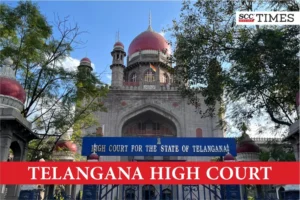Telangana High Court: The present writ petition was filed seeking to declare Respondent 2’s actions in passing order dated 3-2-2024 as illegal and arbitrary, whereby petitioner’s leased premises, that is, Anand Bhavan Grand Restaurant Anand Bhavan Hotel Chat Mantra (Food Stall) at TOWN HALL, was seized without following due procedure of law. T. Vinod Kumar, J.*, held that the disputes arising under the contract of the present nature would not be amenable to writ jurisdiction and since the writ petition filed also involved disputed factual aspect, the writ was not maintainable.
Background
Petitioner stated that he was granted lease of the property known as ‘town hall’ for a period of five years under registered rent/lease agreement dated 26-2-2022 on the terms and conditions agreed upon and while he was carrying on its activities, Respondent 2 issued notice dated 22-1-2024 claiming that petitioner had violated various covenants of the agreement. Respondent 2 without considering the explanation/reply filed by petitioner, issued proceeding dated 3-2-2024 and seized the premises/property leased to it.
Petitioner submitted that as per the covenants of the lease deed, he was permitted to set up stalls to reflect the culture and traditions of Telangana and thus he had set up a hotel by obtaining a trade license from the Municipal authorities concerned. It was also submitted that Respondent 2 was fully aware of petitioner carrying on the business of opening and running of the restaurant from the commencement of the lease term itself.
Petitioner further stated that though the impugned proceeding issued stated that an Appeal to be preferred against the District Collector, Jagtial or RDMA, Warangal, the same would not preclude petitioner from invoking the extraordinary jurisdiction of this Court under Article 226 of the Constitution, as illegal and high-handed acts of the present nature could be corrected in writ proceedings and mere existence of alternate remedy was not a bar.
Analysis, Law, and Decision
The Court opined that the grant of Lease of the Town Hall by Respondent 2 in petitioner’s favour under the agreement dated 26-2-2022 was purely contractual and private and did not involve any element of public law. Though Respondent 2 by exercising power under Section 55 of Telangana Municipalities Act, 2019 (‘the Act’) had entered into agreement with petitioner, that by itself would not automatically lead to the conclusion of involvement of public law or public law issue.
The Court further opined that though as per Section 52(9) of the Act, it was the duty and responsibility of the Commissioner to provide for amenities and facilities like community halls, the agreement in the present case was neither entered into for the purpose of maintaining nor operating the town hall on behalf of respondent as provided under Section 52(9) of the Act to claim involvement of element of public law. On the contrary, it was a contract purely of commercial nature where the municipality, pursuant to a resolution passed by the council, had leased the subject property on an agreed consideration payable by petitioner as a lessee. Thus, the agreement under which the immovable property of Respondent 2 had been leased out would be construed like any commercial contract governed by the provisions of Contract Act, 1872.
The Court opined that once the agreement entered into between petitioner and Respondent 2 was considered as a contract like any other contract, for the enforcement of the covenants of the contract or for any breach thereof, the parties had to work out their remedies under civil law. Thus, an allegation that the subject premises was seized by the authorities under the state’s capacity would not by itself convert the inherent nature of the disputes. Therefore, the same would not be amenable to writ jurisdiction.
The Court opined that running of food joints namely, ‘Anand Bhavan Hotel’, ‘Anand Bhavan Grand Restaurant’, ‘Chat Mantra’, apart from running ‘New Grand Mandi & Biryani Barbie Que’ at the entry point of the Town Hall could not be considered as Telangana eateries and stalls reflecting the culture and traditions of Telangana.
The Court relied on Shubhas Jain v. Rajeshwari Shivam, (2021) 20 SCC 454 and opined that in writ jurisdiction under Article 226 of the Constitution, the Court could not venture into disputed questions of fact. The Court also relied on National Highway Authority of India v. Ganga Enterprises, (2003) 7 SCC 410 and Noble Resources Ltd. v. State of Orissa, (2006) 10 SCC 236, and opined that the Courts could not decide matters relating to the breach of contract in exercise of powers conferred under Article 226 of the Constitution.
The Court thus held that the disputes arising under the contract of the present nature would not be amenable to writ jurisdiction and since the writ petition filed also involved disputed factual aspect, the writ was not maintainable, and petitioner was not entitled for grant of any relief.
The Court after taking note of the concession given by Respondent 2 in the impugned order by filing of appeal to the District Collector or to RDMA, Warangal, opined that though an appeal was not strictly maintainable under the provisions of the Act, petitioner could seek the revision of the impugned order passed by Respondent 2 by approaching the District Collector since the said authority was subject to the jurisdiction of the District Collector under Section 53(5) of the Act, if he was so advised or else he was at liberty to work-out his remedies in civil law.
[Kotagiri Jay Kumar v. State of Telangana, 2024 SCC OnLine TS 45, decided on 21-2-2024]
*Judgment authored by: Justice T. Vinod Kumar
Advocates who appeared in this case :
For the Petitioner: Kowlur Archana, Counsel
For the Respondents: Government Pleader for MA&UD; Jagan Madhav Rao, Standing Counsel


